考研英语狂人95分阅读满分笔记
1995考研英语一阅读理解逐句翻译

1995 Text 1Paragraph 11、Money spent on advertising is money spent as well as any I know of. 花在广告上的钱和我所知花在任何别的方面的钱一样是值得的。
2、It serves directly to assist a rapid distribution of goods at reasonable prices, thereby establishing a firm home market and so making it possible to provide for export at competitive prices. 它直接有利于商品以合理的价格快速地销售,从而建立稳固的国内市场,并且有可能以有竞争力的价格提供出口商品。
2.1 distribution英/dɪstrɪ'bjuːʃ(ə)n/ 美/'dɪstrə'bjʊʃən/n. 分布;分配2.2 thereby英/ðeə'baɪ/ 美/,ðɛr'baɪ/adv. 从而,因此;在那附近;在那方面3、By drawing attention to new ideas it helps enormously to raise standards of living. By helping to increase demand it ensures an increased need for labour, and is therefore an effective way to fight unemployment. 通过向公众推出新思想,它极大地促进生活水准的提高。
通过帮助增加商品需求,它确保对劳动力的更大需求,因此成为对抗失业的一项有效措施。
3.1 enormously英/ɪ'nɔːməslɪ/ 美/ɪ'nɔrməsli/adv. 巨大地,庞大地;非常地,在极大程度上3.2 labour英/'leɪbə/ 美/ˈlebɚ/n. 劳动力,人工;分娩vi. 劳动;分娩;费力地前进4、It lowers the costs of many services: without advertisements your daily newspaper would cost four times as much, the price of your television license would need to be doubled and travel by bus or tube would cost 20 per cent more. 它降低了许多服务费用:没有广告,日报的价格将是现在的四倍,电视许可证价格会翻一番,乘汽车或地铁出行也将贵出百分之二十。
考研英语历年真题阅读理解精读笔记.doc
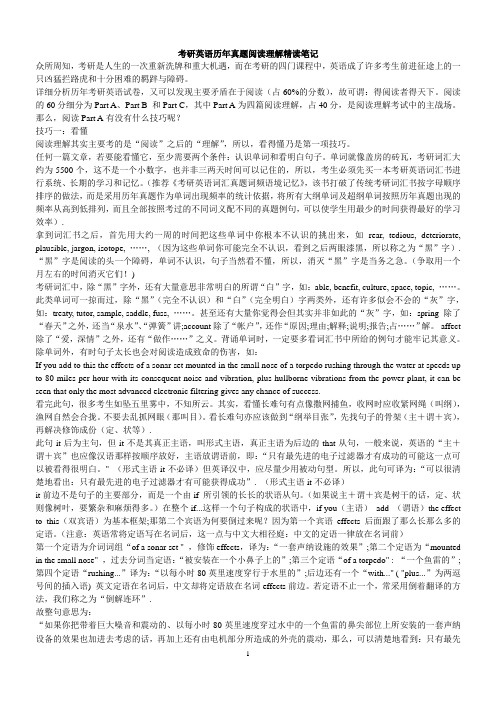
考研英语历年真题阅读理解精读笔记众所周知,考研是人生的一次重新洗牌和重大机遇,而在考研的四门课程中,英语成了许多考生前进征途上的一只凶猛拦路虎和十分困难的羁跘与障碍。
详细分析历年考研英语试卷,又可以发现主要矛盾在于阅读(占60%的分数),故可谓:得阅读者得天下。
阅读的60分细分为Part A、Part B 和Part C,其中Part A为四篇阅读理解,占40分,是阅读理解考试中的主战场。
那么,阅读Part A有没有什么技巧呢?技巧一:看懂阅读理解其实主要考的是“阅读”之后的“理解”,所以,看得懂乃是第一项技巧。
任何一篇文章,若要能看懂它,至少需要两个条件:认识单词和看明白句子。
单词就像盖房的砖瓦,考研词汇大约为5500个,这不是一个小数字,也并非三两天时间可以记住的,所以,考生必须先买一本考研英语词汇书进行系统、长期的学习和记忆。
(推荐《考研英语词汇真题词频语境记忆》,该书打破了传统考研词汇书按字母顺序排序的做法,而是采用历年真题作为单词出现频率的统计依据,将所有大纲单词及超纲单词按照历年真题出现的频率从高到低排列,而且全部按照考过的不同词义配不同的真题例句,可以使学生用最少的时间获得最好的学习效率).拿到词汇书之后,首先用大约一周的时间把这些单词中你根本不认识的挑出来,如rear, tedious, deteriorate, plausible, jargon, isotope, ……, (因为这些单词你可能完全不认识,看到之后两眼漆黑,所以称之为“黑”字). “黑”字是阅读的头一个障碍,单词不认识,句子当然看不懂,所以,消灭“黑”字是当务之急。
(争取用一个月左右的时间消灭它们!)考研词汇中,除“黑”字外,还有大量意思非常明白的所谓“白”字,如:able, benefit, culture, space, topic, ……。
此类单词可一掠而过,除“黑”(完全不认识)和“白”(完全明白)字两类外,还有许多似会不会的“灰”字,如:treaty, tutor, sample, saddle, fuss, ……。
考研英语狂人95分笔记

一.考研阅读的基本解题思路:(四步走)第一,扫描提干,划关键项。
第二,通读全文,抓住中心。
1.通读全文,抓两个重点:①首段(中心句、核心概念常在第一段,常在首段出题);②其他各段的段首和段尾句。
(其他部分略读,有重点的读)2.抓住中心,用一分半时间思考3个问题:①文章叙述的主要内容是什么?②文章中有无提到核心概念?③作者的大致态度是什么?第三,仔细审题,返回原文。
(仔细看题干,把每道题和原文的某处建立联系,挂起钩)定位原则:①通常是由题干出发,使用寻找关键词定位原则。
(关键词:大写字母、地名、时间、数字等)②自然段定位原则。
出题的顺序与行文的顺序是基本一致的,一般每段对应一题。
★要树立定位意识,每一题、每一选项都要回到原文中某一处定位。
第四,重叠选项,得出答案。
(重叠原文=对照原文)1.通过题干返回原文:判断四个选项,抓住选项中的关键词,把选项定位到原文的某处比较,重叠选项,选出答案。
2.作题练习要求:要有选一个答案的理由和其余三个不选的理由二.阅读理解的解题技巧1.例证题:①例证题的标记。
当题干中出现example,case,illustrate,illustration,exemplify时。
②返回原文,找出该例证所在的位置,既给该例子定位。
③搜索该例证周围的区域,90%向上,10%向下,找出该例证支持的观点。
例子周围具有概括抽象性的表达通常就是它的论点。
注意:举例的目的是为了支持论点或是为了说明主题句。
举例后马上问这个例子说明了什么问题?不能用例子中的话来回答这个问题。
④找出该论点,并与四个选项比较,得出选项中与该论点最一致的答案。
⑤例证题错误答案设计的干扰特征经常是:就事论事。
即用例子中的某一内容拉出来让你去选。
(╳)要求:在阅读中,遇到长的例子,立即给这个例子定位,即找出起始点,从哪开始到哪结束。
2.指代题:①返回原文,找出出题的指代词。
②向上搜索,找最近的名词、名词性短语或句子(先从最近点开始找,找不到再找次近的,一般答案不会离得太远)。
考研英语1995-阅读真题_全文翻译
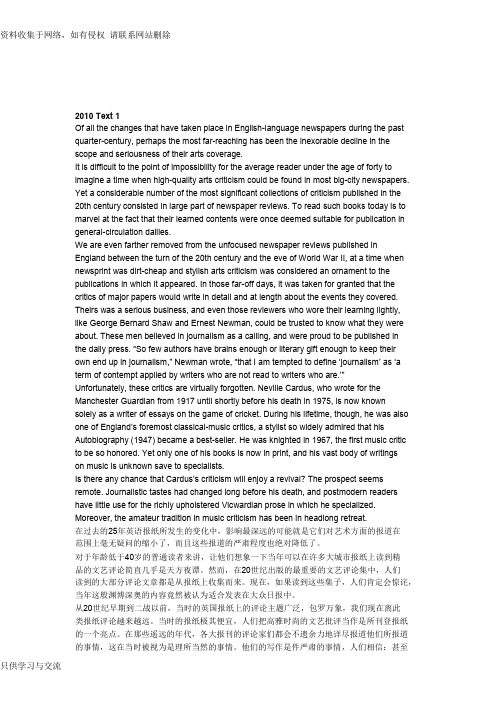
资料收集于网络,如有侵权请联系网站删除2010 Text 1Of all the changes that have taken place in English-language newspapers during the past quarter-century, perhaps the most far-reaching has been the inexorable decline in the scope and seriousness of their arts coverage.It is difficult to the point of impossibility for the average reader under the age of forty to imagine a time when high-quality arts criticism could be found in most big-city newspapers. Yet a considerable number of the most significant collections of criticism published in the20th century consisted in large part of newspaper reviews. To read such books today is to marvel at the fact that their learned contents were once deemed suitable for publication in general-circulation dailies.We are even farther removed from the unfocused newspaper reviews published in England between the turn of the 20th century and the eve of World War II, at a time when newsprint was dirt-cheap and stylish arts criticism was considered an ornament to the publications in which it appeared. In those far-off days, it was taken for granted that the critics of major papers would write in detail and at length about the events they covered. Theirs was a serious business, and even those reviewers who wore their learning lightly, like George Bernard Shaw and Ernest Newman, could be trusted to know what they were about. These men believed in journalism as a calling, and were proud to be published inthe daily press. “So few authors have brains enough or literary gift enough to keep their own end up in journalism,” Newman wrote, “that I am tempted to define ‘journalism’ as ‘a term of contempt applied by writers who are not read to writers who are.’”Unfortunately, these critics are virtually forgotten. Neville Cardus, who wrote for the Manchester Guardian from 1917 until shortly before his death in 1975, is now knownsolely as a writer of essays on the game of cricket. During his lifetime, though, he was also one of England’s foremost classical-music critics, a stylist so widely admired that his Autobiography (1947) became a best-seller. He was knighted in 1967, the first music critic to be so honored. Yet only one of his books is now in print, and his vast body of writingson music is unknown save to specialists.Is there any chance that Cardus’s criticism will enjoy a revival? The prospect seems remote. Journalistic tastes had changed long before his death, and postmodern readers have little use for the richly upholstered Vicwardian prose in which he specialized. Moreover, the amateur tradition in music criticism has been in headlong retreat.在过去的25年英语报纸所发生的变化中,影响最深远的可能就是它们对艺术方面的报道在范围上毫无疑问的缩小了,而且这些报道的严肃程度也绝对降低了。
考研英语历年阅读理解真题精析--1995年part5

Part FiveThat experiences influence subsequent behavior is evidence of an obvious but nevertheless remarkable activity called remembering. Learning could not occur without the function popularly named memory. Constant practice has such as effect on memory as to lead to skillful performance on the piano, to recitation of a poem, and even to reading and understanding these words. So-called intelligent behavior demands memory , remembering being a primary requirement for reasoning. The ability to solve any problem or even to recognize that a problem exists depends on memory. Typically, the decision to cross a street is based on remembering many earlier experiences .Practice (or review)tends to build and maintain memory for a task or for any learned material. Over a period of no practice what has been learned tends to be forgotten; and the adaptive consequences may not seem obvious. Yet, dramatic instances of sudden forgetting can seem to be adaptive. In this sense, the ability to forget can be interpreted to have survived through a process of natural selection in animals. Indeed, when one's memory of an emotionally painful experience lead to serious anxiety, forgetting may produce relief. Nevertheless, an evolutionary interpretation might make it difficult to understand how the commonly gradual process of forgetting survived natural selection.In thinking about the evolution of memory together with all its possible aspects, it is helpful to consider what would happen if memories failed to fade. Forgetting clearly aids orientation in time, since old memories weaken and the new tend to stand out, providing clues for inferring duration. Without forgetting, adaptive ability would suffer, for example ,learned behavior that might have been correct a decade ago may no longer be. Cases are recorded of people who (by ordinary standards)forgot so little that their everyday activities were full of confusion. This forgetting seems to serve that survival of the individual and the species.Another line of thought assumes a memory storage system of limited capacity that provides adaptive flexibility specifically through forgetting. In this view, continual adjustments are made between learning or memory storage ( input)and forgetting (output). Indeed, there is evidence that the rate at which individuals forget is directly related to how much they have learned. Such data offers gross support of contemporary models of memory that assume an input-output balance.17. From the evolutionary point of view,__.(A)forgetting for lack of practice tends to be obviously inadaptive .(B)if a person gets very forgetful all of a sudden he must be very adaptive(C)the gradual process of forgetting is an indication of an individual' s adaptability(D)sudden forgetting may bring about adaptive consequences18. According to the passage, if a person never forgot ,__.(A)he would survive best(B)he would have a lot of trouble(C)his ability to learn would be enhanced(D)the evolution of memory would stop19. From the last paragraph we know that__.(A)forgetfulness is a response to learning(B)the memory storage system is an exactly balanced input-output system(C)memory is a compensation for forgetting(D)the capacity of a memory storage system is limited because forgetting occurs20. In this article, the author tries to interpret the function of__.(A)remembering (B)forgetting(C)adapting D)experiencingUnit 2(1995)Part5重点词汇:subsequent(随后的)←sub+sequ+ent,sub-在下,sequ(=follow)词根“跟随”,-ent形容词后缀。
考研英语阅读高分笔记
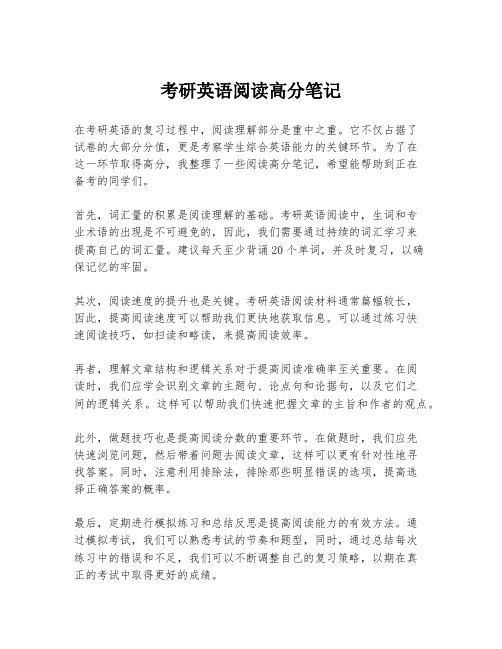
考研英语阅读高分笔记在考研英语的复习过程中,阅读理解部分是重中之重。
它不仅占据了试卷的大部分分值,更是考察学生综合英语能力的关键环节。
为了在这一环节取得高分,我整理了一些阅读高分笔记,希望能帮助到正在备考的同学们。
首先,词汇量的积累是阅读理解的基础。
考研英语阅读中,生词和专业术语的出现是不可避免的,因此,我们需要通过持续的词汇学习来提高自己的词汇量。
建议每天至少背诵20个单词,并及时复习,以确保记忆的牢固。
其次,阅读速度的提升也是关键。
考研英语阅读材料通常篇幅较长,因此,提高阅读速度可以帮助我们更快地获取信息。
可以通过练习快速阅读技巧,如扫读和略读,来提高阅读效率。
再者,理解文章结构和逻辑关系对于提高阅读准确率至关重要。
在阅读时,我们应学会识别文章的主题句、论点句和论据句,以及它们之间的逻辑关系。
这样可以帮助我们快速把握文章的主旨和作者的观点。
此外,做题技巧也是提高阅读分数的重要环节。
在做题时,我们应先快速浏览问题,然后带着问题去阅读文章,这样可以更有针对性地寻找答案。
同时,注意利用排除法,排除那些明显错误的选项,提高选择正确答案的概率。
最后,定期进行模拟练习和总结反思是提高阅读能力的有效方法。
通过模拟考试,我们可以熟悉考试的节奏和题型,同时,通过总结每次练习中的错误和不足,我们可以不断调整自己的复习策略,以期在真正的考试中取得更好的成绩。
总之,考研英语阅读的高分不是一蹴而就的,它需要我们在日常的学习中不断积累和练习。
通过扩大词汇量、提高阅读速度、理解文章结构、掌握做题技巧以及定期进行模拟练习,我们可以逐步提高自己的阅读能力,最终在考试中取得理想的成绩。
考研英语历年阅读理解真题精析--1995年part2

考研英语历年阅读理解真题精析--1995年part2Part TwoThere are two basic ways to see growth: one as a product, the other as a process. People have generally viewed personal growth as an external result or product that can easily be identified and measured. The worker who gets a promotion, the student whose grades improve, the foreigner who learns a new language-all these are examples of people who have measurable results to show for their efforts.By contrast, the process of personal growth is much more difficult to determine, since by definition it is a journey and not the specific signposts or landmarks along the way. The process is not the road itself, but rather the attitudes and feelings people have, their caution or courge, as they encounter new experiences and unexpected obstacles. In this process ,the journey never really ends; there are always new ways to experience the world, new ideas to try, new challenges to accept .In order to grow, to travel new roads, people need to have a willingness to take risks, to confront the unknown, and to accept the possibility that they may "fail" at first. How we see our-selves as we try a new way of being is essential to our ability to grow. Do we perceive ourselves as quick and curious? If so, then we tend to take more chances and to be more open to unfamiliar experiences. Do we think we're shy and indecisive? Then our sense of timidity can cause us to hesitate, to move slowly, and not to take a step until we know the ground is safe. Do we think we're slow to adapt to change or that we' re not smart enough to cope with a new challenge? Then we are likely to take a more passive role or not try at all.These feelings of insecurity and self-doubt are both unavoidable and necessary if we are to change and grow. If we do not confront and overcome these internal fearsand doubts, if we protect ourselves too much, then we cease to grow. We become trapped inside a shell of our own making .5 . A person is generally believed to achieve personal growth then__.(A)he has given up his smoking habit(B)he has made great efforts in his work(C)he is keen on learnning anything new(D)he has tried to determine where he is on his journey6. In the author' s eyes, one who views personal growth as a process would__.(A)succeed in climbing up the social ladder(B)judge his ability to glow from his own achievements(C)face difficulties and take up challenges(D)aim high and reach his goal each time7. When the author says "a new way of being" (line 3, para. 3)he is referring to__.(A)a new approach to experiencing the world(B)a new way of taking risks(C)a new method of perceiving ourselves(D)a new system of adaptation to change8. For personal growth ,the author advocates all of the following except_.(A)curiosity about more chances(B)promptness in self-adaptation(C)open-mindedness to new experiences(D)avoidance of internal fears and doubtsUnit 2(1995)Part 2重点词汇:external(外部的),反义词为internal(内部的)。
1995年考研英语阅读+翻译 横版

Text 1Money spent on advertising is money spent as well as any I know of. It serves directly to assist a rapid distribution of goods at reasonable prices, thereby establishing a firm home market and so making it possible to provide for export at competitive prices. By drawing attention to new ideas it helps enormously to raise standards of living. By helping to increase demand it ensures an increased need for labour, and is therefore an effective way to fight unemployment. It lowers the costs of many services: without advertisements your daily newspaper would cost four times as much, the price of your television license would need to be doubled and travel by bus or tube would cost 20 per cent more.And perhaps most important of all, advertising provides a guarantee of reasonable value in the products and services you buy. Apart from the fact that twenty-seven Acts of Parliament govern the terms of advertising, no regular advertiser dare promote a product that fails to live up to the promise of his advertisements. He might fool some people for a little while through misleading advertising. He will not do so for long, for mercifully the public has the good sense not to buy the inferior article more than once. If you see an article consistently advertised, it is the surest proof I know that the article does what is claimed for it, and that it represents good value.Advertising does more for the material benefit of the community than any other force I can think of.There is one point I feel I ought to touch on. Recently I heard a well-known television personality declare that he was against advertising because it persuades rather than informs. He was drawing excessively fine distinctions. Of course advertising seeks to persuade.If its message were confined merely to information -- and that in itself would be difficult if not impossible to achieve, for even a detail such as the choice of the colour of a shirt is subtly persuasive -- advertising would be so boring that no one would pay any attention. But perhaps that is what the well-known television personality wants.51. By the first sentence of the passage the author means that ________.[A] he is fairly familiar with the cost of advertising[B] everybody knows well that advertising is money consuming[C] advertising costs money like everything else[D] it is worthwhile to spend money on advertising52. In the passage, which of the following is NOT included in the advantages of advertising?[A] Securing greater fame.[B] Providing more jobs.[C] Enhancing living standards.[D] Reducing newspaper cost.53. The author deems that the well-known TV personality is ________.[A] very precise in passing his judgment on advertising[B] interested in nothing but the buyers’ attention[C] correct in telling the difference between persuasion and information[D] obviously partial in his views on advertising54. In the author’s opinion, ________.[A] advertising can seldom bring material benefit to man by providinginformation[B] advertising informs people of new ideas rather than wins them over[C] there is nothing wrong with advertising in persuading the buyer[D] the buyer is not interested in getting information from an advertisementText 2There are two basic ways to see growth: one as a product, the other as a process. People have generally viewed personal growth as an external result or product that can easily be identified and measured. The worker who gets a promotion, the student whose grades improve, the foreigner who learns a new language -- all these are examples of people who have measurable results to show for their efforts.By contrast, the process of personal growth is much more difficult to determine, since by definition it is a journey and not the specific signposts or landmarks along the way. The process is not the road itself, but rather the attitudes and feelings people have, their caution or courage, as they encounter new experiences and unexpected obstacles. In this process, the journey never really ends; there are always new ways to experience the world, new ideas to try, new challenges to accept.In order to grow, to travel new roads, people need to have a willingness to take risks, to confront the unknown, and to accept the possibility that they may “fail”at first. How we see ourselves as we try a new way of being is essential to our ability to grow. Do we perceive ourselves as quick and curious? If so, then we tend to take more chances and to be more open to unfamiliar experiences. Do we think we’re shy and indecisive? Then our sense of timidity can cause us to hesitate, to move slowly, and not to take a step until we know the ground is safe. Do we think we’re slow to adapt to change or that we’re not smart enough to cope with a new challenge? Then we are likely to take a more passive role or not try at all.These feelings of insecurity and self-doubt are both unavoidable and necessary if we are to change and grow. If we do not confront and overcome these internal fears and doubts, if we protect ourselves too much, then we cease to grow. We become trapped inside a shell of our own making.55. A person is generally believed to achieve personal growth when________.[A] he has given up his smoking habit[B] he has made great efforts in his work[C] he is keen on leaning anything new[D] he has tried to determine where he is on his journey56. In the author’s eyes, one who views personal growth as a processwould ________.[A] succeed in climbing up the social ladder[B] judge his ability to grow from his own achievements[C] face difficulties and take up challenges[D] aim high and reach his goal each time57. When the author says “a new way of being” (Line 2~3, Para. 3) heis referring to ________.[A] a new approach to experiencing the world[B] a new way of taking risks[C] a new method of perceiving ourselves[D] a new system of adaptation to change58. For personal growth, the author advocates all of the following EXCEPT________.[A] curiosity about more chances[B] promptness in self-adaptation[C] open-mindedness to new experiences[D] avoidance of internal fears and doubtsText 3In such a changing, complex society formerly simple solutions to informational needs become complicated. Many of life’s problems which were solved by asking family members, friends or colleagues are beyond the capability of the extended family to resolve. Where to turn for expert information and how to determine which expert advice to accept are questions facing many people today.In addition to this, there is the growing mobility of people since World War II. As families move away from their stable community, their friends of many years, their extended family relationships, the informal flow of information is cut off, and with it the confidence that information will be available when needed and will be trustworthy and reliable. The almost unconscious flow of information about the simplest aspects of living can be cut off. Thus, things once learned subconsciously through the casual communications of the extended family must be consciously learned.Adding to social changes today is an enormous stockpile of information.The individual now has more information available than any generation, and the task of finding that one piece of information relevant to his or her specific problem is complicated, time-consuming and sometimes even overwhelming.Coupled with the growing quantity of information is the development of technologies which enable the storage and delivery of more information with greater speed to more locations than has ever been possible before. Computer technology makes it possible to store vast amounts of data in machine-readable files, and to program computers to locate specific information. Telecommunications developments enable the sending of messages via television, radio, and very shortly, electronic mail to bombard people with multitudes of messages. Satellites have extended the power of communications to report events at the instant of occurrence. Expertise can be shared world wide through teleconferencing, and problems in dispute can be settled without the participants leaving their homes and/or jobs to travel to a distant conference site. Technology has facilitated the sharing of information and the storage and delivery of information, thus making more information available to more people.In this world of change and complexity, the need for information is of greatest importance. Those people who have accurate, reliable up-to-date information to solve the day-to-day problems, the critical problems of their business, social and family life, will survive and succeed. “Knowledge is power” may well be the truest saying and access to information may be the most critical requirement of all people.59. The word “it” (Line 3, Para. 2) most probably refers to ________.[A] the lack of stable communities[B] the breakdown of informal information channels[C] the increased mobility of families[D] the growing number of people moving from place to place60. The main problem people may encounter today arises from the factthat ________.[A] they have to learn new things consciously[B] they lack the confidence of securing reliable and trustworthy information[C] they have difficulty obtaining the needed information readily[D] they can hardly carry out casual communications with an extended family61. From the passage we can infer that ________.[A] electronic mail will soon play a dominant role in transmitting messages[B] it will become more difficult for people to keep secrets in an information era[C] people will spend less time holding meetings or conferences[D] events will be reported on the spot mainly through satellites62. We can learn from the last paragraph that ________.[A] it is necessary to obtain as much knowledge as possible[B] people should make the best use of the information accessible[C] we should realize the importance of accumulating information[D] it is of vital importance to acquire needed information efficientlyText 4Personality is to a large extent inherent -- A-type parents usually bring about A-type offspring. But the environment must also have a profound effect, since if competition is important to the parents, it is likely to become a major factor in the lives of their children. One place where children soak up A-characteristics is school, which is, by its very nature, a highly competitive institution. Too many schools adopt the “win at all costs” moral standard and measure their success by sporting achievements. The current passion for making children compete against their classmates or against the clock produces a two-layer system, in which competitive A-types seem in some way better than their B-type fellows. Being too keen to win can have dangerous consequences: remember that Pheidippides, the first marathon runner, dropped dead seconds after saying: “Rejoice, we conquer!”By far the worst form of competition in schools is the disproportionate emphasis on examinations. It is a rare school that allows pupils to concentrate on those things they do well. The merits of competition by examination are somewhat questionable, but competition in the certain knowledge of failure is positively harmful.Obviously, it is neither practical nor desirable that all A youngsters change into B’s. The world needs A types, and schools have an important duty to try to fit a child’s personality to his possible future employment. It is top management.If the preoccupation of schools with academic work was lessened, more time might be spent teaching children surer values. Perhaps selection for the caring professions, especially medicine, could be made less by good grades in chemistry and more by such considerations as sensitivity and sympathy. It is surely a mistake to choose our doctors exclusively from A-type stock. B’s are important and should be encouraged.63. According to the passage, A-type individuals are usually ________.[A] impatient[B] considerate[C] aggressive[D] agreeable64. The author is strongly opposed to the practice of examinations at schools because ________.[A] the pressure is too great on the students[B] some students are bound to fail[C] failure rates are too high[D] the results of exanimations are doubtful65. The selection of medical professionals is currently based on ________.[A] candidates’ sensitivity[B] academic achievements[C] competitive spirit[D] surer values66. From the passage we can draw the conclusion that ________.[A] the personality of a child is well established at birth[B] family influence dominates the shaping of one’s characteristics[C] the development of one’s personality is due to multiple factors[D] B-type characteristics can find no place in competitive societyText 5That experiences influence subsequent behaviour is evidence of an obvious but nevertheless remarkable activity called remembering. Learning could not occur without the function popularly named memory. Constant practice has such an effect on memory as to lead to skillful performance on the piano, to recitation of a poem, and even to reading and understanding these words. So-called intelligent behaviour demands memory, remembering being a primary requirement for reasoning. The ability to solve any problem or even to recognize that a problem exists depends on memory. Typically, the decision to cross a street is based on remembering many earlier experiences. Practice (or review) tends to build and maintain memory for a task or for any learned material. Over a period of no practice what has been learned tends to be forgotten; and the adaptive consequences may not seem obvious. Yet, dramatic instances of sudden forgetting can be seen to be adaptive. In this sense, the ability to forget can be interpreted to have survived through a process of natural selection in animals. Indeed, when one’s memory of an emotionally painful experience leads to serious anxiety, forgetting may produce relief. Nevertheless, an evolutionary interpretation might make it difficult to understand how the commonly gradual process of forgetting survived natural selection.In thinking about the evolution of memory together with all its possible aspects, it is helpful to consider what would happen if memories failed to fade. Forgetting clearly aids orientation in time, since old memories weaken and the new tend to stand out, providing clues for inferring duration. Without forgetting, adaptive ability would suffer, for example, learned behaviour that might have been correct a decade ago may no longer be. Cases are recorded of people who (by ordinary standards) forgot so little that their everyday activities were full of confusion. This forgetting seems to serve that survival of the individual and the species.Another line of thought assumes a memory storage system of limitedcapacity that provides adaptive flexibility specifically through forgetting. In this view, continual adjustments are made between learning or memory storage (input) and forgetting (output). Indeed, there is evidence that the rate at which individuals forget is directly related to how much they have learned. Such data offer gross support of contemporary models of memory that assume an input-output balance.67. From the evolutionary point of view, ________.[A] forgetting for lack of practice tends to be obviously inadaptive[B] if a person gets very forgetful all of a sudden he must be very adaptive[C] the gradual process of forgetting is an indication of an individual’s adaptability[D] sudden forgetting may bring about adaptive consequences68. According to the passage, if a person never forgot, ________.[A] he would survive best[B] he would have a lot of trouble[C] his ability to learn would be enhanced[D] the evolution of memory would stop69. From the last paragraph we know that ________.[A] forgetfulness is a response to learning[B] the memory storage system is an exactly balanced input-output system[C] memory is a compensation for forgetting[D] the capacity of a memory storage system is limited because forgetting occurs70. In this article, the author tries to interpret the function of ________.[A] remembering[B] forgetting[C] adapting[D] experiencingSection IV English-Chinese TranslationDirections:Read the following passage carefully and then translate underlined sentences into Chinese. Your translation must be written neatly on ANSWER SHEET 2. (15 points)The standardized educational or psychological tests that are widely used to aid in selecting, classifying, assigning, or promoting students, employees, and military personnel have been the target of recent attacks on books, magazines, the daily press, and even in Congress. 71) The target is wrong, for in attacking the tests, critics divert attention from the fault that lies with ill-informed or incompetent users. The tests themselves are merely tools, with characteristics that can be measured with reasonable precision under specified conditions. Whether the results will be valuable, meaningless, or even misleading depends partly upon the tool itself but largely upon the user.All informed predictions of future performance are based upon some knowledge of relevant past performance: school grades, research productivity, sales records, or whatever is appropriate. 72) How well the predictions will be validated by later performance depends upon the amount, reliability, and appropriateness of the information used and on the skill andwisdom with which it is always interpreted. Anyone who keeps careful score knows that the information available is always incomplete and that the predictions are always subject to error.Standardized tests should be considered in this context. They provide a quick, objective method of getting some kinds of information about what a person learned, the skills he has developed, or the kind of person he is. The information so obtained has, qualitatively, the same advantages and shortcomings as other kinds of information. 73) Whether to use tests, other kinds of information, or both in a particular situation depends, therefore, upon the evidence from experience concerning comparative validity and upon such factors as cost and availability.74) In general, the tests work most effectively when the qualities to be measured can be most precisely defined and least effectively when what is to be measured or predicted cannot be well defined. Properly used, they provide a rapid means of getting comparable information about many people. Sometimes they identify students whose high potential has not been previously recognized, but there are many things they do not do. 75) For example, they do not compensate for gross social inequality, and thus do not tell how able an underprivileged youngster might have been had he grown up under more favorable circumstances.KEY:51. [D] 52. [A] 53. [D] 54. [C] 55. [A] 56. [C] 57. [A] 58. [D] 59. [B] 60. [C] 61. [A] 62. [D] 63. [C] 64. [B] 65. [B] 66. [C] 67. [D] 68. [B] 69. [A] 70. [B]71. 把标准化测试作为抨击目标是错误的,因为在抨击这类测试时,批评者不考虑其弊病来自人们对测试不甚了解或使用不当。
考研英语历年阅读理解真题精析--1995年part5
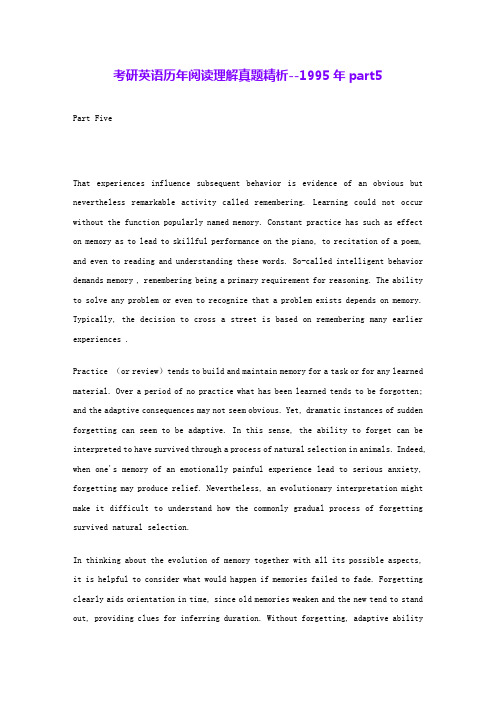
考研英语历年阅读理解真题精析--1995年part5Part FiveThat experiences influence subsequent behavior is evidence of an obvious but nevertheless remarkable activity called remembering. Learning could not occur without the function popularly named memory. Constant practice has such as effect on memory as to lead to skillful performance on the piano, to recitation of a poem, and even to reading and understanding these words. So-called intelligent behavior demands memory , remembering being a primary requirement for reasoning. The ability to solve any problem or even to recognize that a problem exists depends on memory. Typically, the decision to cross a street is based on remembering many earlier experiences .Practice (or review)tends to build and maintain memory for a task or for any learned material. Over a period of no practice what has been learned tends to be forgotten; and the adaptive consequences may not seem obvious. Yet, dramatic instances of sudden forgetting can seem to be adaptive. In this sense, the ability to forget can be interpreted to have survived through a process of natural selection in animals. Indeed, when one's memory of an emotionally painful experience lead to serious anxiety, forgetting may produce relief. Nevertheless, an evolutionary interpretation might make it difficult to understand how the commonly gradual process of forgetting survived natural selection.In thinking about the evolution of memory together with all its possible aspects, it is helpful to consider what would happen if memories failed to fade. Forgetting clearly aids orientation in time, since old memories weaken and the new tend to stand out, providing clues for inferring duration. Without forgetting, adaptive abilitywould suffer, for example ,learned behavior that might have been correct a decade ago may no longer be. Cases are recorded of people who (by ordinary standards)forgot so little that their everyday activities were full of confusion. This forgetting seems to serve that survival of the individual and the species.Another line of thought assumes a memory storage system of limited capacity that provides adaptive flexibility specifically through forgetting. In this view, continual adjustments are made between learning or memory storage ( input)and forgetting (output). Indeed, there is evidence that the rate at which individuals forget is directly related to how much they have learned. Such data offers gross support of contemporary models of memory that assume an input-output balance.17. From the evolutionary point of view,__.(A)forgetting for lack of practice tends to be obviously inadaptive .(B)if a person gets very forgetful all of a sudden he must be very adaptive(C)the gradual process of forgetting is an indication of an individual' s adaptability(D)sudden forgetting may bring about adaptive consequences18. According to the passage, if a person never forgot ,__.(A)he would survive best(B)he would have a lot of trouble(C)his ability to learn would be enhanced(D)the evolution of memory would stop19. From the last paragraph we know that__.(A)forgetfulness is a response to learning(B)the memory storage system is an exactly balanced input-output system(C)memory is a compensation for forgetting(D)the capacity of a memory storage system is limited because forgetting occurs20. In this article, the author tries to interpret the function of__.(A)remembering (B)forgetting(C)adapting D)experiencingUnit 2(1995)Part5重点词汇:subsequent(随后的)←sub+sequ+ent,sub-在下,sequ(=follow)词根"跟随",-ent形容词后缀。
1995年考研英语真题及解析汇报

1995年全国硕士研究生入学统一考试英语试题Section ⅠUse of EnglishSleep is divided into periods of so-called REM sleep, characterized by rapid eye movements and dreaming, and longer periods of non-REM sleep. 1 kind of sleep is at all well-understood, but REM sleep is 2 to serve some restorative function of the brain. The purpose of non-REM sleep is even more 3 . The new experiments, such as these 4 for the first time at a recent meeting of the Society for Sleep Research in Minneapolis, suggest fascinating explanations 5 of non-REM sleep.For example, it has long been known that total sleep 6 is 100 percent fatal to rats, yet, 7 _examinations of the dead bodies, the animals look completely normal.A researcher has now8 the mystery of why the animals die. The rats 9 bacterial infections of the blood, 10 their immune systems—the self-protecting mechanisrn against disease—had crashed.1. [A] Either [B] Neither [C] Each [D] Any2. [A] intended [B] required [C] assumed [D] inferred3. [A] subtle [B] obvious [C] mysterious [D] doubtful4. [A] maintained [B] described [C] settled [D] afforded5. [A] in the light [B] by virtue [C] with the exception [D] for thepurpose6. [A] reduction [B] destruction [C] deprivation [D] restriction7. [A] upon [B] by [C] through [D] with8. [A] paid attention to [B] caught sight of [C] laid emphasis on [D] cast light on9. [A] develop [B] produce [C] stimulate [D] induce10. [A] if [B] as if [C] only if [D] if only一、文章结构总体分析睡眠分为浅睡阶段和较长时间的深睡阶段。
考研英语超级精读笔记猫叔
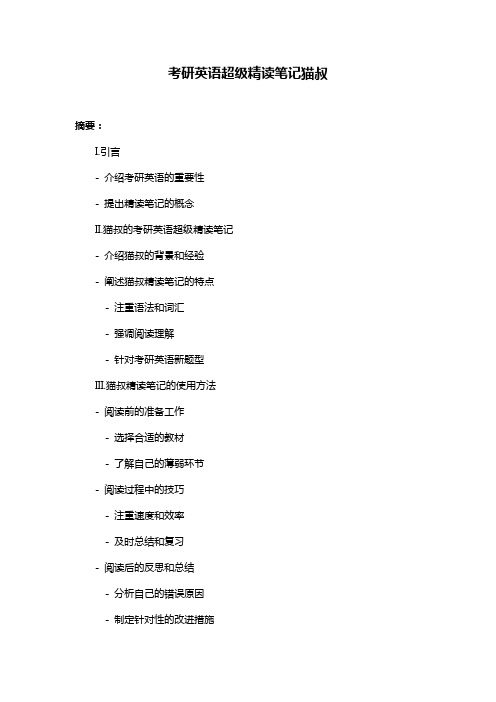
考研英语超级精读笔记猫叔摘要:I.引言- 介绍考研英语的重要性- 提出精读笔记的概念II.猫叔的考研英语超级精读笔记- 介绍猫叔的背景和经验- 阐述猫叔精读笔记的特点- 注重语法和词汇- 强调阅读理解- 针对考研英语新题型III.猫叔精读笔记的使用方法- 阅读前的准备工作- 选择合适的教材- 了解自己的薄弱环节- 阅读过程中的技巧- 注重速度和效率- 及时总结和复习- 阅读后的反思和总结- 分析自己的错误原因- 制定针对性的改进措施IV.猫叔精读笔记的效果和评价- 提高考生的阅读理解能力- 帮助考生掌握考研英语新题型- 受到广大考生的好评和认可正文:考研英语超级精读笔记猫叔随着考研英语的重要性日益凸显,越来越多的考生开始寻找有效的备考方法。
其中,精读笔记被认为是一种非常有效的学习方式。
本文将为大家介绍一位备受推崇的考研英语精读笔记专家——猫叔,以及他的超级精读笔记。
猫叔是一位有着丰富考研英语辅导经验的专家,他的精读笔记以注重语法和词汇、强调阅读理解、针对考研英语新题型而著称。
猫叔认为,语法和词汇是英语学习的基础,只有掌握了这两点,才能在考研英语中取得高分。
因此,他的精读笔记特别注重这两方面的讲解,旨在帮助考生打牢基础。
此外,猫叔的精读笔记还强调阅读理解。
他认为,阅读理解是考研英语的重要组成部分,只有通过大量阅读,才能提高阅读速度和理解能力。
因此,他的精读笔记选取了大量的真题和模拟题进行讲解,让考生在实战中提高阅读理解能力。
针对考研英语新题型,猫叔的精读笔记也给出了独特的见解。
他结合自己的辅导经验,总结出了一套应对新题型的方法和技巧,帮助考生在考试中游刃有余。
那么,如何使用猫叔的精读笔记呢?首先,考生在阅读前要进行充分的准备工作,如选择合适的教材、了解自己的薄弱环节等。
阅读过程中,要注重速度和效率,及时总结和复习所学内容。
阅读后,要反思和总结自己的阅读经历,分析错误原因,并制定针对性的改进措施。
总之,猫叔的考研英语超级精读笔记为考生提供了一种有效的备考方法。
考研英语狂人95分,阅读满分笔记(新东方范猛老师讲的2014)
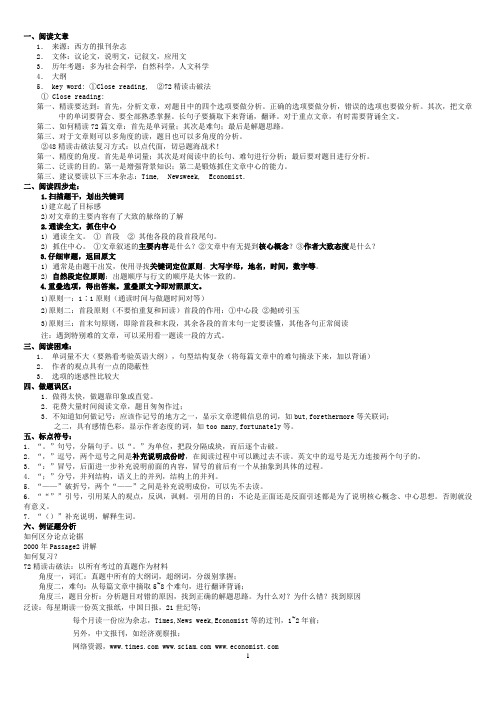
一、阅读文章1.来源:西方的报刊杂志2.文体:议论文,说明文,记叙文,应用文3.历年考题:多为社会科学,自然科学,人文科学4.大纲5.key word: ①Close reading, ②72精读击破法① Close reading:第一、精读要达到:首先,分析文章,对题目中的四个选项要做分析。
正确的选项要做分析,错误的选项也要做分析。
其次,把文章中的单词要背会、要全部熟悉掌握。
长句子要摘取下来背诵,翻译。
对于重点文章,有时需要背诵全文。
第二、如何精读72篇文章:首先是单词量;其次是难句;最后是解题思路。
第三、对于文章则可以多角度的读,题目也可以多角度的分析。
②48精读击破法复习方式:以点代面,切忌题海战术!第一、精度的角度。
首先是单词量;其次是对阅读中的长句、难句进行分析;最后要对题目进行分析。
第二、泛读的目的。
第一是增强背景知识;第二是锻炼抓住文章中心的能力。
第三、建议要读以下三本杂志:Time, Newsweek, Economist.二、阅读四步走:1.扫描题干,划出关键词1)建立起了目标感2)对文章的主要内容有了大致的脉络的了解2.通读全文,抓住中心1) 通读全文。
① 首段② 其他各段的段首段尾句。
2) 抓住中心。
①文章叙述的主要内容是什么?②文章中有无提到核心概念?③作者大致态度是什么?3.仔细审题,返回原文1) 通常是由题干出发,使用寻找关键词定位原则。
大写字母,地名,时间,数字等。
2) 自然段定位原则:出题顺序与行文的顺序是大体一致的。
4.重叠选项,得出答案。
重叠原文 即对照原文。
1)原则一:1∶1原则(通读时间与做题时间对等)2)原则二:首段原则(不要怕重复和回读)首段的作用:①中心段②抛砖引玉3)原则三:首末句原则,即除首段和末段,其余各段的首末句一定要读懂,其他各句正常阅读注:遇到特别难的文章,可以采用看一题读一段的方式。
三、阅读困难:1.单词量不大(要熟看考验英语大纲),句型结构复杂(将每篇文章中的难句摘录下来,加以背诵)2.作者的观点具有一点的隐蔽性3.选项的迷惑性比较大四、做题误区:1.做得太快,做题靠印象或直觉。
考研英语超级精读笔记猫叔

考研英语超级精读笔记猫叔(最新版)目录1.猫叔的考研英语超级精读笔记概述2.笔记的主要内容和价值3.猫叔的推荐网课和公众号4.猫叔的考研英语翻译笔记5.猫叔的建议和提醒正文猫叔的考研英语超级精读笔记概述猫叔的考研英语超级精读笔记是一份非常实用且详细的考研英语学习资料。
这份笔记是猫叔在准备考研过程中自己整理出来的,不仅参考了教材的讲解,还融入了自己的做题方法和经验。
猫叔的笔记涵盖了考研英语的各个方面,从词汇到语法,从阅读理解到写作,都有详细的讲解和实例。
对于考研英语的学习,这份笔记具有很高的参考价值。
笔记的主要内容和价值猫叔的考研英语超级精读笔记主要包括以下几个方面:1.阅读理解:猫叔根据自己的做题经验,总结出了阅读理解的解题技巧和方法,这些方法不仅简单易懂,而且十分实用。
同时,猫叔还提供了大量的阅读理解练习题,帮助考生提高阅读理解能力。
2.完形填空:猫叔在完形填空部分详细介绍了题型特点和解题技巧,并且为考生提供了很多实用的做题方法。
3.新题型:猫叔对考研英语新题型的解题方法进行了深入研究,并整理出了一套完整的解题笔记。
这些笔记对考生来说非常有价值,可以帮助他们在考试中迅速找到解题思路。
4.翻译:猫叔的翻译笔记主要包括翻译技巧和实例分析。
这些内容对考生提高翻译能力非常有帮助。
猫叔的推荐网课和公众号猫叔在文章中推荐了一些网课和公众号,这些课程和公众号可以为考生提供更多的学习资源和帮助。
以下是猫叔推荐的课程和公众号:1.考研英语新题型做题方法讲解视频2.一烫公众号:这个公众号上有很多真题分栏整理资料,方便考生做题。
猫叔的考研英语翻译笔记猫叔的考研英语翻译笔记是一份非常实用的学习资料。
猫叔在笔记中详细介绍了考研英语翻译的技巧和方法,并且为考生提供了大量的实例分析。
这些内容对考生提高翻译能力非常有帮助。
猫叔的建议和提醒猫叔在文章中为考生提供了一些建议和提醒,这些建议和提醒可以帮助考生更好地备考考研英语。
以下是猫叔的一些建议和提醒:1.做题过程中要注意时间管理,不要过分追求速度而忽略了正确率。
考研英语阅读真题正文 全文翻译(1995

考研英语阅读真题正文+全文翻译(19952010 Text 1 在过去的25年英语报纸所发生的变化中,影响最深远的可能就是它们对艺术方面的报道在范围上毫无疑问的缩小了,而且这些报道的严肃程度也绝对降低了。
对于年龄低于40岁的普通读者来讲,让他们想象一下当年可以在许多大城市报纸上读到精品的文艺评论简直几乎是天方夜谭。
然而,在20世纪出版的最重要的文艺评论集中,人们读到的大部分评论文章都是从报纸上收集而来。
现在,如果读到这些集子,人们肯定会惊诧,当年这般渊博深奥的内容竟然被认为适合发表在大众日报中。
从20世纪早期到二战以前,当时的英国报纸上的评论主题广泛,包罗万象,我们现在离此类报纸评论越来越远。
当时的报纸极其便宜,人们把高雅时尚的文艺批评当作是所刊登报纸的一个亮点。
在那些遥远的年代,各大报刊的评论家们都会不遗余力地详尽报道他们所报道的事情,这在当时被视为是理所当然的事情。
他们的写作是件严肃的事情,人们相信:甚至那些博学低调不喜欢炫耀的评论家,比如George Bernard Shaw和Ernest Newman也知道自己在做什么。
这些批评家们相信报刊评论是一项职业,并且对于他们的文章能够在报纸上发表感到很自豪。
“鉴于几乎没有作家能拥有足够的智慧或文学天赋以保证他们在新闻报纸写作中站稳脚跟”,Newman曾写道,“我倾向于把?新闻写作?定义为不受读者欢迎的作家用来嘲讽受读者欢迎的作家的一个?轻蔑之词? ” 不幸的是,这些批评家们现在实际上已被人们遗忘。
从1917年开始一直到1975年去世不久前还在为曼彻斯特《卫报》写文章的Neville Cardus,如今仅仅作为一个撰写关于板球比赛文章的作家被人们所知。
但是,在他的一生当中,他也是英国首屈一指的古典音乐评论家之一。
他也是一位深受读者青睐的文体家,所以1947年他的《自传》一书就成为热销读物。
1967年他被授予爵士称号,也是第一位获此殊荣的音乐评论家。
95年研究生考试英语阅读真题分篇 text-2
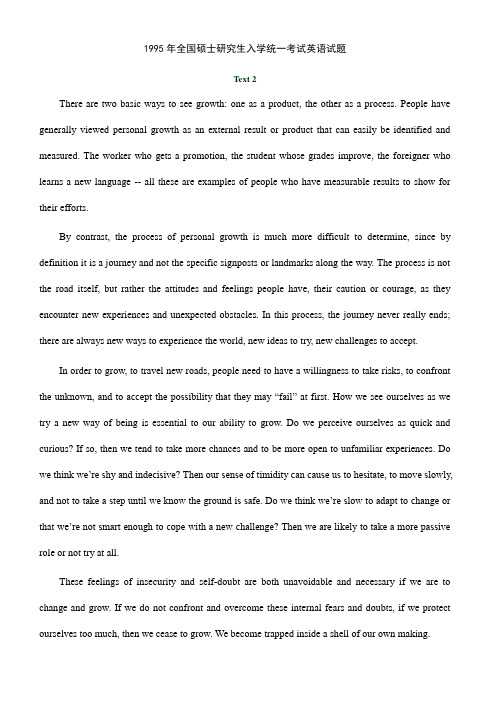
1995年全国硕士研究生入学统一考试英语试题Text 2There are two basic ways to see growth: one as a product, the other as a process. People have generally viewed personal growth as an external result or product that can easily be identified and measured. The worker who gets a promotion, the student whose grades improve, the foreigner who learns a new language -- all these are examples of people who have measurable results to show for their efforts.By contrast, the process of personal growth is much more difficult to determine, since by definition it is a journey and not the specific signposts or landmarks along the way. The process is not the road itself, but rather the attitudes and feelings people have, their caution or courage, as they encounter new experiences and unexpected obstacles. In this process, the journey never really ends; there are always new ways to experience the world, new ideas to try, new challenges to accept.In order to grow, to travel new roads, people need to have a willingness to take risks, to confront the unknown, and to accept the possibility that they may “fail” at first. How we see ourselves as we try a new way of being is essential to our ability to grow. Do we perceive ourselves as quick and curious? If so, then we tend to take more chances and to be more open to unfamiliar experiences. Do we think we’re shy and indecisive? Then our sense of timidity can cause us to hesitate, to move slowly, and not to take a step until we know the ground is safe. Do we think we’re slow to adapt to change or that we’re not smart enough to cope with a new challenge? Then we are likely to take a more passive role or not try at all.These feelings of insecurity and self-doubt are both unavoidable and necessary if we are to change and grow. If we do not confront and overcome these internal fears and doubts, if we protect ourselves too much, then we cease to grow. We become trapped inside a shell of our own making.55. A person is generally believed to achieve personal growth when ________.[A] he has given up his smoking habit[B] he has made great efforts in his work[C] he is keen on leaning anything new[D] he has tried to determine where he is on his journey56. In the author’s eyes, one who views personal growth as a process would ________.[A] succeed in climbing up the social ladder[B] judge his ability to grow from his own achievements[C] face difficulties and take up challenges[D] aim high and reach his goal each time57. When the author says “a new way of being” (Line 2~3, Para. 3) he is referring to ________.[A] a new approach to experiencing the world[B] a new way of taking risks[C] a new method of perceiving ourselves[D] a new system of adaptation to change58. For personal growth, the author advocates all of the following EXCEPT ________.[A] curiosity about more chances[B] promptness in self-adaptation[C] open-mindedness to new experiences[D] avoidance of internal fears and doubts。
1995考研英语阅读真题

1995考研英语阅读真题1995考研英语阅读真题分析与解析1995年的考研英语阅读真题,考察了考生对于阅读理解和细节理解的能力。
本文将对这篇阅读真题进行分析和解析,帮助考生更好地理解文章内容和提高解题技巧。
文章内容回顾1995年的考研英语阅读真题中,文章的主题是关于心理学中的“情绪情感”和个体的“幸福感”之间的关系。
文章首先介绍了心理学家对情绪情感和幸福感进行的实证研究,然后引用了一些相关的实例和案例来支持他们的观点。
最后,文章结合了一些数据和统计数字,论述了幸福感的重要性以及其对个体的积极影响。
解析与讨论1. 核心思想:文章的核心思想是关于情绪情感和幸福感之间的关系。
根据文章的内容,可以得出结论:情绪情感对于个体的幸福感具有积极的影响。
2. 实证研究:文章提到了一些心理学家进行的实证研究。
这些研究包括问卷调查、实地观察和实验等方法。
通过这些实证研究,心理学家发现了情绪情感和幸福感之间的一些关联和规律。
3. 实例和案例:为了支持文章的观点,作者引用了一些实例和案例。
这些实例和案例描述了一些情绪情感和幸福感之间的具体联系,展示了幸福感对于个体生活的重要性。
4. 数据和统计数字:文章最后引用了一些数据和统计数字,用以证明幸福感的重要性。
这些数据和统计数字包括幸福感与个体健康、人际关系和工作表现之间的关系等。
解题技巧1. 关键词定位:阅读题目时,要注意关键词的定位和理解。
通过找到关键词,可以更准确地找到文章中与题目相关的信息。
2. 理解句子结构:文章中的句子结构可能较复杂,包含较长的修饰语和从句等。
考生需要注意理解句子结构,把握句子的主干和关键信息。
3. 细节理解:阅读题目时,要注重细节的理解和把握。
一些题目可能会要求考生找到文章中的具体细节,如实例、数据等。
4. 推理推断:阅读题目时,考生需要通过对文意的理解,进行推理和推断。
根据文章的论述和事实信息,可以推断出一些与题目相关的答案。
总结通过对1995年的考研英语阅读真题进行分析和解析,我们可以得到以下结论:这篇文章主要讨论了情绪情感与个体幸福感之间的关系,通过实证研究和案例分析,支持了情绪情感对幸福感的积极影响。
考研英语:历年真题阅读要点之1995_毙考题_3
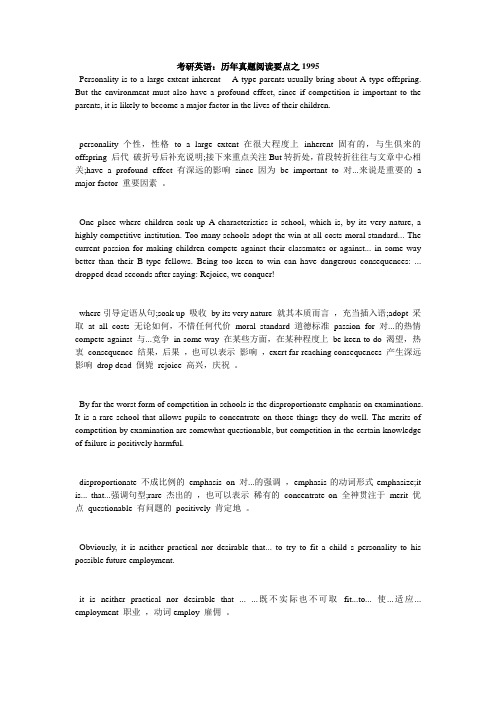
考研英语:历年真题阅读要点之1995Personality is to a large extent inherent -- A-type parents usually bring about A-type offspring. But the environment must also have a profound effect, since if competition is important to the parents, it is likely to become a major factor in the lives of their children.personality 个性,性格to a large extent 在很大程度上inherent 固有的,与生俱来的offspring 后代破折号后补充说明;接下来重点关注But转折处,首段转折往往与文章中心相关;have a profound effect 有深远的影响since 因为be important to 对...来说是重要的 a major factor 重要因素。
One place where children soak up A-characteristics is school, which is, by its very nature, a highly competitive institution. Too many schools adopt the win at all costs moral standard... The current passion for making children compete against their classmates or against... in some way better than their B-type fellows. Being too keen to win can have dangerous consequences: ... dropped dead seconds after saying: Rejoice, we conquer!where引导定语从句;soak up 吸收by its very nature 就其本质而言,充当插入语;adopt 采取at all costs 无论如何,不惜任何代价moral standard 道德标准passion for 对...的热情compete against 与...竞争in some way 在某些方面,在某种程度上be keen to do 渴望,热衷consequence 结果,后果,也可以表示影响,exert far-reaching consequences 产生深远影响drop dead 倒毙rejoice 高兴,庆祝。
- 1、下载文档前请自行甄别文档内容的完整性,平台不提供额外的编辑、内容补充、找答案等附加服务。
- 2、"仅部分预览"的文档,不可在线预览部分如存在完整性等问题,可反馈申请退款(可完整预览的文档不适用该条件!)。
- 3、如文档侵犯您的权益,请联系客服反馈,我们会尽快为您处理(人工客服工作时间:9:00-18:30)。
一、阅读文章
1.来源:西方的报刊杂志
2.文体:议论文,说明文,记叙文,应用文
3.历年考题:多为社会科学,自然科学,人文科学
4.大纲
5.key word: ①Close reading, ②72精读击破法
① Close reading:
第一、精读要达到:首先,分析文章,对题目中的四个选项要做分析。
正确的选项要做分析,错误的选项也要做分析。
其次,把文章中的单词要背会、要全部熟悉掌握。
长句子要摘取下来背诵,翻译。
对于重点文章,有时需要背诵全文。
第二、如何精读72篇文章:首先是单词量;其次是难句;最后是解题思路。
第三、对于文章则可以多角度的读,题目也可以多角度的分析。
②48精读击破法复习方式:以点代面,切忌题海战术!
第一、精度的角度。
首先是单词量;其次是对阅读中的长句、难句进行分析;最后要对题目进行分析。
第二、泛读的目的。
第一是增强背景知识;第二是锻炼抓住文章中心的能力。
第三、建议要读以下三本杂志:Time, Newsweek, Economist.
二、阅读四步走:
1.扫描题干,划出关键词
1)建立起了目标感
2)对文章的主要内容有了大致的脉络的了解
2.通读全文,抓住中心
1) 通读全文。
① 首段② 其他各段的段首段尾句。
2) 抓住中心。
①文章叙述的主要内容是什么?②文章中有无提到核心概念?③作者大致态度是什么?
3.仔细审题,返回原文
1) 通常是由题干出发,使用寻找关键词定位原则。
大写字母,地名,时间,数字等。
2) 自然段定位原则:出题顺序与行文的顺序是大体一致的。
4.重叠选项,得出答案。
重叠原文 即对照原文。
1)原则一:1∶1原则(通读时间与做题时间对等)
2)原则二:首段原则(不要怕重复和回读)首段的作用:①中心段②抛砖引玉
3)原则三:首末句原则,即除首段和末段,其余各段的首末句一定要读懂,其他各句正常阅读
注:遇到特别难的文章,可以采用看一题读一段的方式。
三、阅读困难:
1.单词量不大(要熟看考验英语大纲),句型结构复杂(将每篇文章中的难句摘录下来,加以背诵)
2.作者的观点具有一点的隐蔽性
3.选项的迷惑性比较大
四、做题误区:
1.做得太快,做题靠印象或直觉。
2.花费大量时间阅读文章,题目匆匆作过;
3.不知道如何做记号:应该作记号的地方之一,显示文章逻辑信息的词,如but,forethermore等关联词;
之二,具有感情色彩,显示作者态度的词,如too many,fortunately等。
五、标点符号:
1.“。
”句号,分隔句子。
以“。
”为单位,把段分隔成块,而后逐个击破。
2.“,”逗号,两个逗号之间是补充说明成份时,在阅读过程中可以跳过去不读。
英文中的逗号是无力连接两个句子的,
3.“:”冒号,后面进一步补充说明前面的内容,冒号的前后有一个从抽象到具体的过程。
4.“;”分号,并列结构,语义上的并列,结构上的并列。
5.“——”破折号,两个“——”之间是补充说明成份,可以先不去读。
6.““””引号,引用某人的观点,反讽,讽刺。
引用的目的:不论是正面还是反面引述都是为了说明核心概念、中心思想。
否则就没有意义。
7.“()”补充说明,解释生词。
六、例证题分析
如何区分论点论据
2000年Passage2讲解
如何复习?
72精读击破法:以所有考过的真题作为材料
角度一,词汇:真题中所有的大纲词,超纲词,分级别掌握;
角度二,难句:从每篇文章中摘取5~8个难句,进行翻译背诵;
角度三,题目分析:分析题目对错的原因,找到正确的解题思路。
为什么对?为什么错?找到原因
泛读:每星期读一份英文报纸,中国日报,21世纪等;
每个月读一份应为杂志,Times,News week,Economist等的过刊,1~2年前;
另外,中文报刊,如经济观察报;
网络资源,
例证题分析复习
1999年真题passage5
2000年真题passage4、passage5
1996年真题(社会科学-经济史)passage3(社会科学-发明史)passage4
七、如何做主旨题
1997年真题(社会科学-新闻报道)passage1
八、推断作者态度题
1998年真题(自然科学-生态学) passage1
1997年真题(社会科学-文化人类学)passage2
1998年真题(自然科学史)passage3
九、如何做判断题
十、如何做词汇题
1999年真题(社会科学-法律)passage1
宏观的阅读方法
错误答案的设置陷阱
2001年真题(社会科学-传播学)passage3
2001年真题(人文科学-散文)Passage5
2002年真题(说明文)passage1
十一、如何做推理题
2002年真题passage4
2003年真题passage2passage4passage1
2004年真题(社会科学-造诣学)passage4
1999年真题passage3
2004年真题passage2passage1passage3
2005年真题passage1passage4(人文科学-文学评论)passage2passage3
2006年真题passage1(社会科学-人口学)passage2passage4(人文科学-散文)2007年真题passage1passage2passage3passage4
十二、阅读方法总结:
标准一:真题中没有任何一个单词是生词
标准二:真题中没有任何一个长句是难句
标准三:真题中每个选项都知道其在原文中的相应出处
%复习方法:⑴朗读和背诵(需要背的文章:94-1/3/5 95-4/5 96-2/5 97-1/2、98-5 99-1 00-1/2/3/5
01-3/5)
⑵制作三套卡片:①单词:正面单词,背面音标及意思②长难句:正面原句,背面翻译
③精彩表达的积累,用于写作
%快速重复背单词:强调背诵的“快”和“重复”
⑴要降低一次背诵的期望值,重复是解决遗忘的最好办法
⑵背单词不要利用黄金时间和整块时间
%定量定范围泛读,做少量模拟题
⑴验证自己在真题中形成的解题思路
⑵扩大阅读范围
%注意:一定要做错误分析!。
